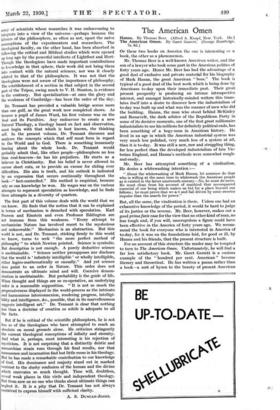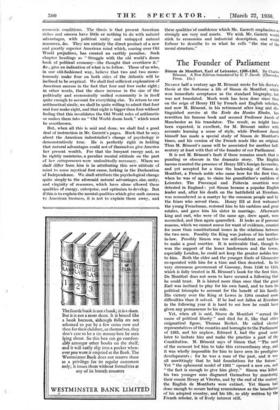The American Omen OF these two books on America the
one is interesting us a book, the other as a phenomenon.
Mr. Thomas Beer is a well-known American writer, and the son of a lawyer who took some part in the American politics of forty years ago. Hence Mr. Beer has had the advantage of a good deal of exclusive and private material for his biography of Mark Hanna, the great American " boss." The book is typical of a good deal of the best work which is being done by Americans to-day upon their immediate past. Their great present prosperity is producing an intense introspective interest, and amongst historically-minded writers this trans- lates itself into a desire to discover how the industrialism of to-day was built up and what was the manner of men who did the building. Hanna, the man who stood behind McKinley and Roosevelt, the dark arbiter of the Republican Party in some of its decisive moments, one of the first great millionaire industrialists to use his millions for definitely political ends, has been something of a bogy-man in American history. He lived in an age in which the American industrial system was very much less polished, very much less of a system at all, than it is to-day. It was still a new, raw and struggling thing, far less perfect than the developed industrialism of late Vic- torian England, and Hanna's methods were somewhat rough- and-ready.
Mr. Beer has attempted something of a vindication. He denies a whitewashing intention :- "About the whitewashing of Mark Hanna, lot someone do that who is willing at the same time to whitewash the American people as it existed in the latter nineteenth century—No, he must do more. He must clean from his account of mankind that unconquered essential of our being which makes us bid for a place beyond our fellows ; he must prove that we at and fail driven by some sweeter impulse than the search for power."
But, all the same, the vindication is there. Unless one had an exhaustive knowledge of the period, it would be hard to judge, of its justice or the reverse. Mr. Beer, however, makes out a good prima facie case for the view that no other kind of man, no less tough and, if you will, unscrupulous a figure could have been effective in the America of forty years ago. We recom- mend the book for everyone who is interested in America of to-day, for it was on the foundations laid, for good or ill, by Hanna and his friends, that the present structure is built.
For an account of this structure the reader may be tempted to turn to The American Omen. Unfortunately, he will find a far less satisfactory book. Mr. Garet Garrett is a curious example of the " hundred per cent. American " become literary and theoretical. He has written a paean rather than a book—a sort of hymn to the beauty of present American economic conditions. The thesis is that present American riches and success have little or nothing to do with natural advantages, with political unity and untapped natural resources, &c. They are entirely the direct product of a new and greatly superior American mind which, soaring over Old World prejudices, has created an earthly paradise. Such chapter headings as " Struggle with the old world's doom book of political economy—the thought that overthrew it," &c., give an indication of what is to follow. Those of us who, in our old-fashioned way, believe that two and two mono- tonously Make four on both sides of the Atlantic will be inclined to be sceptical. We shall find sufficient explanation of American success in the fact that four and four make eight ; in other words, that the sheer increase in the size of the politically and economically unified community is in itself quite enough to account for everything else. To return to our arithmetical simile, we shall be quite willing to admit that four and four makeeight, and that eight is bigger than four without feeling that this invalidates the Old World rules of arithmetic or makes them into an " Old World doom book'_' .which must be overthrown.
But, when all this is said and done, we shall find a good deal of instruction in Mr. Garrett's pages. Much that he says about the A,merican industrialist's change of psychology is demonstratively true. He is perfectly right in holding that natural advantages could not of themselves give America her present .wealth For that the buoyant energy, and, as he rightly maintains, a peculiar mental attitude on the part of her entrepreneurs were undoubtedly necessary. .Where we shall differ from him is in-- attributing this new attitude of mind to some mystical first cause, lurking in the Declaration of Independence. We shall attribute the psychological change quite simply to the aforesaid natural advantages, size, unity, and virginity of resources, which have alone allowed these qualities of energy, enterprise, and optimism to develop. But if this is to explain the mental qualities which give sudh success to American business, it is not to explain them away, and these qualities of confidence which Mr. Garrett emphasizes so strongly are very real assets. We wish Mr. Garrett would stick to economics and industrial description, and would forbear to describe to us what he calls "the. rise of the moral structure."



















































 Previous page
Previous page